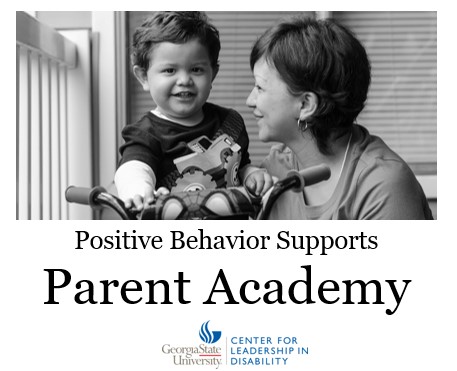The Center for Leadership in Disability Hosts Positive Behavior Support Workshop for Caregivers
April 27, 2020

|
Atlanta, GA - The Center for Leadership in Disability (CLD) in partnership with the Georgia Department of Public Health offered a series of Positive Behavior Support Parent Academies for caregivers of children aged three- to five-years-old who engaged in persistent, challenging behaviors. The Positive Behavior Support Parent Academy is facilitated over five in-person sessions and includes between-session assignments. Each session includes didactic content, hands-on activities, group discussions, and peer-to-peer support. This format allows families to connect with and support one another and build relationships with others in their communities. In 2019, the CLD hosted eight, five-session Positive Behavior Support Parent Academies with a total of 52 caregivers across Georgia. Positive Behavior Support Parent Academies are continuing into 2020.
During the Positive Behavior Support Parent Academies, caregivers learned how to develop and implement positive behavior supports to address their child's challenging behaviors at home and in the community. We teach caregivers how to understand what their child is communicating when their child is engaging in challenging behavior. Then we teach caregivers how to develop prevention strategies and how to teach their child new, more appropriate ways to communicate their needs. Throughout the parent academy series, each caregiver completes the Brief Behavior Questionnaire and Intervention Plan (BBQuIP), which is a positive behavior support planning tool developed by CLD's Director, Dr. Daniel Crimmins. The BBQuIP helps caregivers prioritize problem behaviors, identify behavior triggers, identify common adult responses to behaviors, and develop individualized behavior support plans for their child. These BBQuIP plans can be shared with therapists, family members, childcare providers, teachers, and other adults in the child's life.
Caregiver participants in the Positive Behavior Support Parent Academies completed pre- and post-assessment measures related to parental stress, parental self-efficacy, self-efficacy related to reducing challenging behaviors, knowledge of positive behavior support, and training satisfaction. Caregivers reported increases in both types of self-efficacy, increases in their knowledge of positive behavior support, and high satisfaction with the parent academy.
Caregivers overwhelmingly reported that the positive behavior support strategies were valuable and applicable to their daily routines. One caregiver shared that participating in the parent academy changed how she interacted with her child, which had positively affected their parent-child relationship. The parent academy taught the parent that behavior is a form of communication, and understanding that one concept helped the parent better understand and support her child.
Gereen Francis, BCaBA, CLD's Behavior Specialist, explained that the Positive Behavior Support Parent Academy is designed to empower caregivers to reduce their child's challenging behaviors. Ms. Francis recognizes that in addition to learning behavior-related content, participants benefit greatly from the group-based problem solving and the support network that forms among caregiver participants.
For more information about the Center for Leadership's Positive Behavior Support Parent Academy, please contact Gereen Francis at [email protected].







